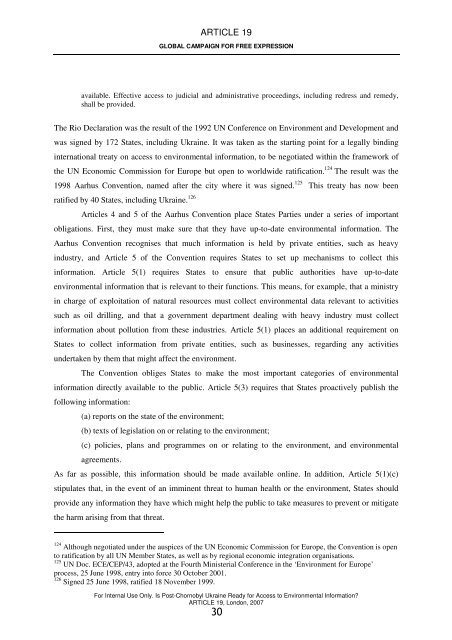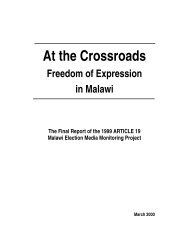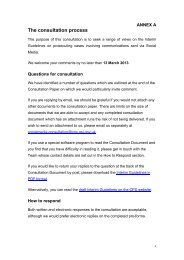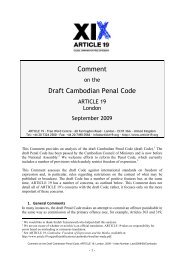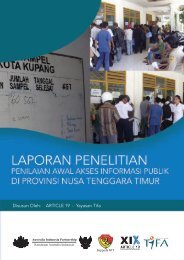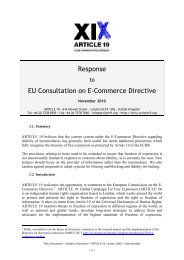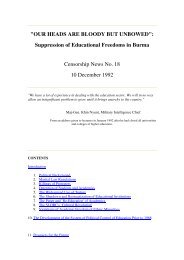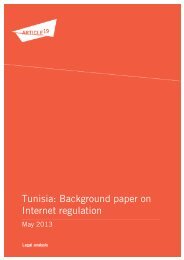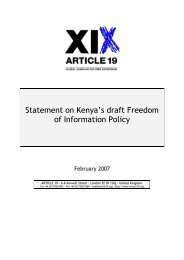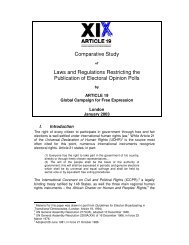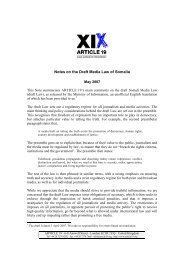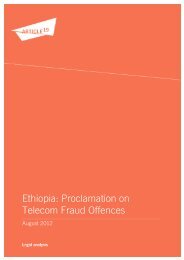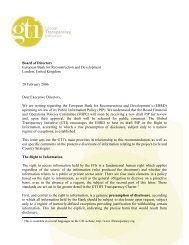FOR INTERNAL USE ONLY - Article 19
FOR INTERNAL USE ONLY - Article 19
FOR INTERNAL USE ONLY - Article 19
- No tags were found...
Create successful ePaper yourself
Turn your PDF publications into a flip-book with our unique Google optimized e-Paper software.
ARTICLE <strong>19</strong>GLOBAL CAMPAIGN <strong>FOR</strong> FREE EXPRESSIONavailable. Effective access to judicial and administrative proceedings, including redress and remedy,shall be provided.The Rio Declaration was the result of the <strong>19</strong>92 UN Conference on Environment and Development andwas signed by 172 States, including Ukraine. It was taken as the starting point for a legally bindinginternational treaty on access to environmental information, to be negotiated within the framework ofthe UN Economic Commission for Europe but open to worldwide ratification. 124 The result was the<strong>19</strong>98 Aarhus Convention, named after the city where it was signed. 125 This treaty has now beenratified by 40 States, including Ukraine. 126<strong>Article</strong>s 4 and 5 of the Aarhus Convention place States Parties under a series of importantobligations. First, they must make sure that they have up-to-date environmental information. TheAarhus Convention recognises that much information is held by private entities, such as heavyindustry, and <strong>Article</strong> 5 of the Convention requires States to set up mechanisms to collect thisinformation. <strong>Article</strong> 5(1) requires States to ensure that public authorities have up-to-dateenvironmental information that is relevant to their functions. This means, for example, that a ministryin charge of exploitation of natural resources must collect environmental data relevant to activitiessuch as oil drilling, and that a government department dealing with heavy industry must collectinformation about pollution from these industries. <strong>Article</strong> 5(1) places an additional requirement onStates to collect information from private entities, such as businesses, regarding any activitiesundertaken by them that might affect the environment.The Convention obliges States to make the most important categories of environmentalinformation directly available to the public. <strong>Article</strong> 5(3) requires that States proactively publish thefollowing information:(a) reports on the state of the environment;(b) texts of legislation on or relating to the environment;(c) policies, plans and programmes on or relating to the environment, and environmentalagreements.As far as possible, this information should be made available online. In addition, <strong>Article</strong> 5(1)(c)stipulates that, in the event of an imminent threat to human health or the environment, States shouldprovide any information they have which might help the public to take measures to prevent or mitigatethe harm arising from that threat.124 Although negotiated under the auspices of the UN Economic Commission for Europe, the Convention is opento ratification by all UN Member States, as well as by regional economic integration organisations.125 UN Doc. ECE/CEP/43, adopted at the Fourth Ministerial Conference in the ‘Environment for Europe’process, 25 June <strong>19</strong>98, entry into force 30 October 2001.126 Signed 25 June <strong>19</strong>98, ratified 18 November <strong>19</strong>99.For Internal Use Only. Is Post-Chornobyl Ukraine Ready for Access to Environmental Information?ARTICLE <strong>19</strong>, London, 2007",


